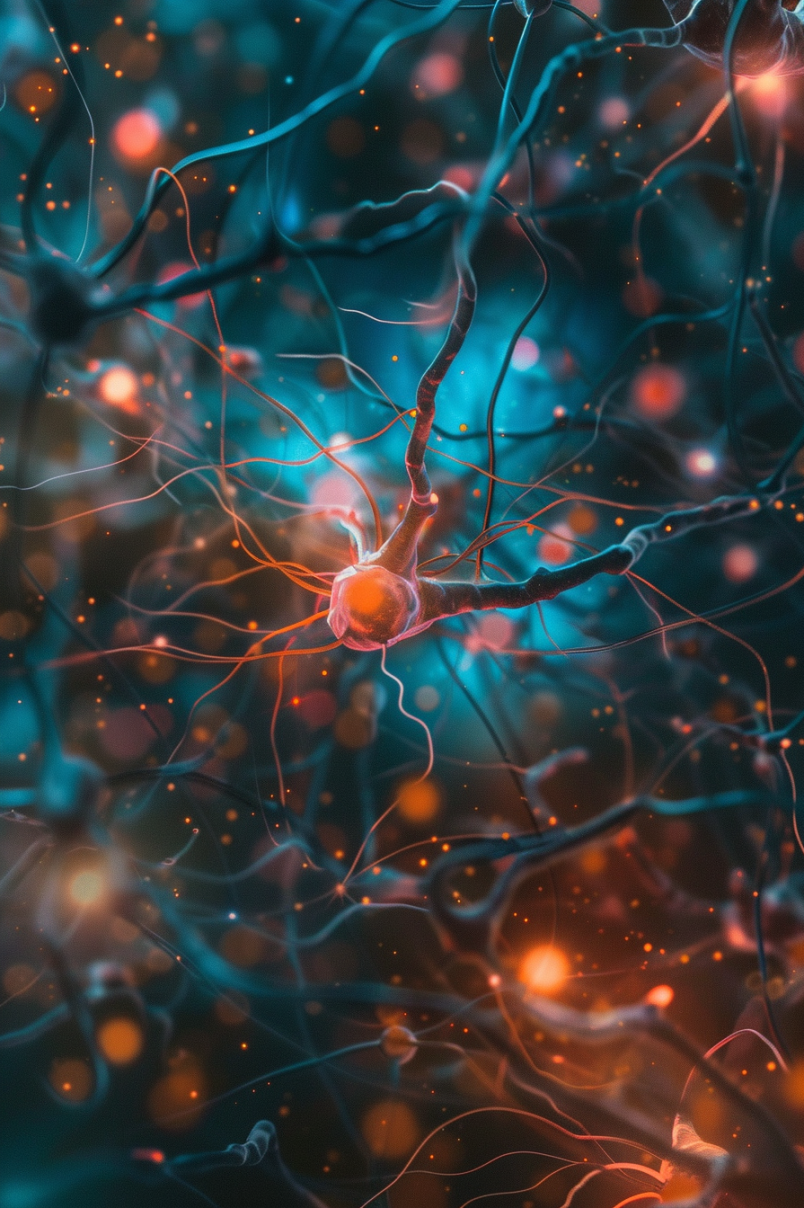
Neurotransmitters are the chemical messengers that play a crucial role in our brain’s functioning, influencing our mood, motivation, appetite, sleep, and many other aspects of our lives.
With over 100 identified neurotransmitters in the human brain, understanding their functions and how they interact with each other is essential for maintaining optimal brain health.
In this article, we’ll delve into the primary functions of neurotransmitters, explore different types, and discuss what happens when there’s an imbalance.
We’ll also provide tips on how to naturally increase or regulate neurotransmitter levels.
Primary Functions of Neurotransmitters
Neurotransmitters act as chemical messengers, transmitting signals between neurons, or nerve cells, in the brain.
They play a vital role in regulating various physiological and psychological processes, including:
Mood regulation
Imagine neurotransmitters as tiny messengers zipping between neurons, influencing our mood, appetite, and sleep patterns.
Serotonin, often dubbed the “feel-good” neurotransmitter, helps stabilize mood and promote feelings of well-being.
Meanwhile, dopamine, another key player, contributes to our motivation levels and how we experience pleasure.
Both serotonin and dopamine work together to keep our emotional state in balance.
Motivation and reward
Dopamine takes center stage when it comes to motivation and reward processing.
It’s like the brain’s own built-in reward system, encouraging us to pursue pleasurable activities and reinforcing behaviors that lead to positive outcomes.
Whether it’s accomplishing a task or indulging in a favorite treat, dopamine is there to signal that something good is happening.
Memory and learning
Neurotransmitters like acetylcholine and glutamate step up to the plate when it’s time to hit the books or learn a new skill.
Acetylcholine plays a significant role in memory formation and retrieval, helping us store and recall information effectively.
Meanwhile, glutamate, the most abundant excitatory neurotransmitter in the brain, facilitates synaptic plasticity, which is essential for learning and adapting to new experiences.
Anxiety and stress response
In moments of stress or anxiety, neurotransmitters like GABA (gamma-aminobutyric acid) and glutamate take charge of our body’s response.
GABA, often referred to as the brain’s “brake pedal,” helps calm neuronal activity, promoting relaxation and reducing feelings of anxiety.
On the other hand, glutamate, while primarily excitatory, also plays a role in modulating stress responses, ensuring we can cope with challenging situations effectively.

Different Types of Neurotransmitters
Delving into the world of neurotransmitters reveals a diverse array of chemical messengers that orchestrate the symphony of our brain’s functions:
Dopamine
Picture dopamine as the brain’s cheerleader for all things pleasurable.
When we experience something rewarding or pleasurable, dopamine swoops in to reinforce that behavior, urging us to seek out more of the same.
Primary function
Dopamine plays a crucial role in reward processing, motivation, and pleasure. When we experience something pleasurable, dopamine is released, motivating us to seek out similar experiences in the future.
Role in brain function
This neurotransmitter is involved in various brain pathways related to motivation, movement, and cognition.
It reinforces behaviors that are linked to pleasure and reward.
Imbalance
Low levels of dopamine can lead to conditions like depression, addiction, and Parkinson’s disease, while high levels may contribute to anxiety and addiction disorders.
Serotonin
Serotonin, often hailed as the “happiness hormone,” wears many hats in the brain’s operation.
It helps regulate our mood, appetite, and sleep patterns, ensuring we feel balanced and content.
Primary function
Serotonin is known for its role in regulating mood, appetite, and sleep.
It helps modulate emotions and behaviors related to these functions.
Role in brain function
Serotonin is involved in numerous brain pathways that influence mood, appetite, and sleep-wake cycles. It also plays a role in pain modulation.
Imbalance
Low serotonin levels are associated with conditions like depression, anxiety disorders, and insomnia, while high levels can lead to serotonin syndrome, which can be potentially life-threatening.
Acetylcholine (ACh)
Think of acetylcholine as the brain’s memory maestro.
It’s instrumental in forming new memories and facilitating learning processes, making it indispensable for cognitive function.
Primary function
ACh is essential for memory formation, learning, and muscle contraction.
It is particularly crucial for cognitive functions.
Role in brain function
This neurotransmitter plays a key role in various brain processes, including the formation of new memories and learning.
It also regulates muscle movement and is involved in the parasympathetic nervous system, promoting relaxation.
Imbalance
Low levels of ACh are linked to Alzheimer’s disease, while high levels can cause muscle weakness and paralysis.
GABA (Gamma-Aminobutyric Acid)
GABA is the brain’s tranquilizer, keeping neuronal activity in check and promoting a sense of calm.
As an inhibitory neurotransmitter, GABA helps dampen down excessive neural firing, making it essential for anxiety and stress regulation.
Primary function
GABA is an inhibitory neurotransmitter that helps regulate anxiety and stress responses.
It promotes a sense of calm and relaxation.
Role in brain function
GABA regulates the activity of neurons, inhibiting excessive firing and promoting relaxation.
It plays a crucial role in maintaining emotional stability.
Imbalance
Low levels of GABA are associated with anxiety disorders, while high levels can lead to sedation and sleepiness.
Glutamate
As the brain’s chief excitatory neurotransmitter, glutamate revs up neuronal activity, particularly in processes related to learning and memory.
It’s like the fuel that powers our cognitive engine, facilitating the formation of new memories and synaptic plasticity.
Primary function
Glutamate is an excitatory neurotransmitter involved in learning and memory processes.
Role in brain function
It plays a vital role in synaptic plasticity, which is crucial for learning and memory formation.
Glutamate is also involved in various brain functions, including motor control and sensory perception.
Imbalance
Excessive glutamate levels can lead to excitotoxicity, causing damage to neurons and contributing to neurodegenerative diseases like Alzheimer’s and Huntington’s disease.

What Happens When There’s an Imbalance of the Neurotransmitter?
When there’s an imbalance of neurotransmitters, it can lead to a range of psychological and physiological symptoms. For example:
Depression
Imagine serotonin and dopamine as the dynamic duo responsible for keeping our mood upbeat and balanced.
When levels of these neurotransmitters dip, it can cast a shadow over our emotional well-being, contributing to feelings of sadness and hopelessness.
Low serotonin and dopamine levels are commonly associated with depression, affecting our ability to experience pleasure and motivation.
Anxiety
GABA and glutamate play a tug-of-war in the brain, with GABA acting as the calming force and glutamate as the excitable one.
When GABA levels plummet or glutamate levels soar, it can tip the scales toward anxiety disorders.
Without enough GABA to keep excessive neural firing in check, the brain goes into overdrive, leading to feelings of worry, fear, and panic.
Addiction
Picture dopamine as the brain’s “reward currency,” flooding our system with feel-good vibes whenever we engage in pleasurable activities.
But when dopamine levels spike too high, it can hijack our brain’s reward circuitry, leading to addictive behaviors.
Whether it’s gambling, substance abuse, or compulsive eating, the pursuit of dopamine-driven rewards can spiral into addiction.
Parkinson’s disease
In Parkinson’s disease, the spotlight shines on dopamine deficiency.
With dwindling levels of dopamine, the brain struggles to coordinate movement and regulate mood, leading to tremors, stiffness, and impaired motor function.
Dopamine replacement therapy aims to replenish dopamine levels, helping alleviate symptoms and improve quality of life for individuals with Parkinson’s disease.

How to Naturally Increase or Regulate Neurotransmitter Levels?
While medication can be effective in treating neurotransmitter imbalances, there are also natural ways to increase or regulate neurotransmitter levels:
Diet
Picture your brain as a gourmet chef, carefully crafting neurotransmitters from the ingredients you feed it.
A balanced diet packed with nutrient-rich foods provides the building blocks necessary for neurotransmitter production.
Omega-3 fatty acids, found in fatty fish like salmon, support brain health and help produce serotonin.
Vitamin D, obtained from sunlight exposure or dietary sources like fortified foods and supplements, plays a role in serotonin synthesis.
B vitamins, found in whole grains, leafy greens, and legumes, are essential for neurotransmitter metabolism and energy production.
Exercise
Think of exercise as a natural mood booster and neurotransmitter enhancer.
When you break a sweat, your brain releases a surge of feel-good neurotransmitters like dopamine and serotonin, promoting a sense of well-being and reducing stress.
Whether it’s a brisk walk, a yoga session, or a dance class, incorporating regular physical activity into your routine can help keep neurotransmitter levels in check.
Sleep
Imagine sleep as the brain’s reset button, essential for neurotransmitter regulation and production.
During sleep, the brain clears out metabolic waste and consolidates memories, allowing neurotransmitter levels to recalibrate.
Aim for 7-9 hours of quality sleep each night to support optimal brain function and mood regulation.
Stress management
Picture stress as a disruptor of neurotransmitter harmony, throwing off the delicate balance in your brain.
By practicing stress-reducing techniques like meditation, deep breathing, or yoga, you can help calm the nervous system and promote neurotransmitter balance.
These mindfulness practices encourage the release of calming neurotransmitters like GABA, while reducing levels of stress hormones like cortisol.
Supplements
While a balanced diet should be your primary source of nutrients, supplements can provide an extra boost when needed.
Omega-3 fatty acid supplements, derived from fish oil or algae, support brain health and neurotransmitter production.
GABA supplements may help promote relaxation and reduce anxiety by increasing GABA levels in the brain.
5-HTP (5-hydroxytryptophan) supplements, a precursor to serotonin, may support serotonin synthesis and mood regulation.

Conclusion
Neurotransmitters play a vital role in our brain’s functioning, influencing our mood, motivation, appetite, sleep, and many other aspects of our lives.
Understanding the primary functions of neurotransmitters, different types, and how to naturally increase or regulate neurotransmitter levels is essential for maintaining optimal brain health.
By incorporating a balanced diet, regular exercise, adequate sleep, and stress management into our daily routine, we can support our neurotransmitter production and regulation, leading to improved overall health and well-being.
FAQs
Dopamine is often considered the most important neurotransmitter, as it plays a crucial role in motivation, pleasure, and reward processing.
A balanced diet rich in omega-3 fatty acids, vitamin D, and B vitamins, combined with regular exercise and adequate sleep, can help increase serotonin levels.
Symptoms can vary depending on the neurotransmitter and the individual, but common symptoms include depression, anxiety, insomnia, and addiction.
Yes, neurotransmitters can be regulated naturally through diet, exercise, sleep, and stress management.



